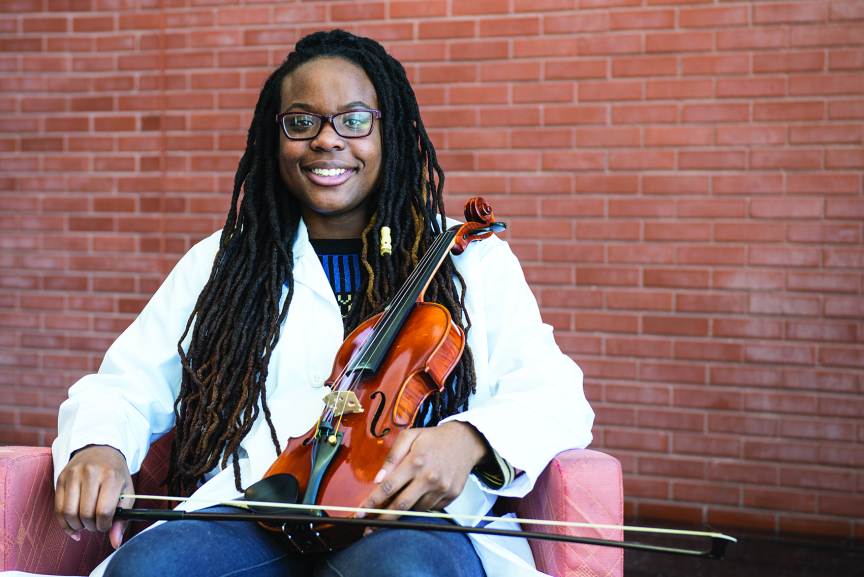Many Interests, But One Love – Science
Rutgers doctoral student at the Graduate School of Biomedical Sciences is recognized for her work on HIV prevention and vaccine development

'I knew I didn’t want to be a physician. I didn’t want to prescribe. I wanted to actually create the medicines that would cure people.'– Zakiya Qualls
Zakiya Qualls is a woman of many interests.
A guitar- and violin-playing Rastafarian, she is fascinated with holistic health and runs her own Afro-centric décor business. But at her core, Qualls is a scientist determined to make the kinds of discoveries that could one day save lives.
From the moment that Qualls took her first biology course as a curious and precocious child enrolled in the talented and gifted program at Heather Hills Elementary School in Bowie, Maryland, she knew that she was going to be a scientist.
“I just fell in love with it,” says Qualls, a Ph.D. student at Rutgers Graduate School of Biomedical Sciences (GSBS) in Newark. “I knew I didn’t want to be a physician. I didn’t want to prescribe. I wanted to actually create the medicines that would cure people.”
It’s the challenging aspects of research – the trial and error, the problem-solving, the troubleshooting and the findings – that Qualls sees as intriguing and rewarding, she says.
Her talents as a student and scientist have garnered her recognition (as an undergraduate she was featured in a 2010 New York Times article headlined, “The Country Can Learn a Lesson From These Students”) as well as awards, coveted scholarships and internships with the National Institutes of Health.
After earning a full scholarship to study at Howard University in Washington, D.C. – a historically black college attended by her great grandmother, grandmother and mother – and graduating cum laude from the school in 2011 with a degree in biological sciences, Qualls could have gone to just about any graduate school in the nation. Instead, she chose to pursue her doctorate at GSBS because, she says, of its facilities, its faculty, its collaborations with other highly respected institutions and its proximity to the culturally diverse communities of the greater New York area.
“I did interviews with a lot of schools,” says Qualls, 25. “I really liked the environment here. I felt they cared… I didn’t even go to the school yet, but sensed they were invested in my future; not just in the school.”
An Alfred P. Sloan Foundation Scholar, Qualls works in the lab of Abraham Pinter at the Public Health Research Institute Center at NJMS. There, she gets to explore her research interests, including immunology virology, and immunopathology while working on her dissertation project which aims to understand how HIV-1 escapes the host neutralizing antibody response by masking sensitive immune targets.
Her work as a student scientist has allowed her to travel to different parts of United States and, most recently, to Canada and South Africa for conferences on HIV prevention and vaccine development.
As for the future, Qualls, who grew up taking violin lessons and taught herself how to play the guitar as a stress reliever, is open to the possibilities. Recognizing that positions in academic science can be difficult to come by for young Ph.D.s, she has set her sights on industry. “Hopefully, I can do a post-doc working for a pharmaceutical or biotech company,” she says.
Qualls, who creates Afro-centric décor featuring African textiles, designs and patterns including, switch plate covers; throw pillows; lamp shades; tissue-box covers; and canvas prints, would also love to somehow combine her love for science with her interest in holistic health. As a practicing Rastafarian, Qualls’s lifestyle puts great emphasis on living a life that is in harmony with nature. However, she says, a lot of information disseminated about “natural living” is not rooted in modern science. That’s where she believes her background as a scientist can come into play. “I feel I could bridge the two.”
Regardless of where her future takes her, Qualls says, “it’s going to involve some type of science.”
A version of this article appeared in the Spring 2015 issue of New Jersey Medical School's Pulse Magazine.